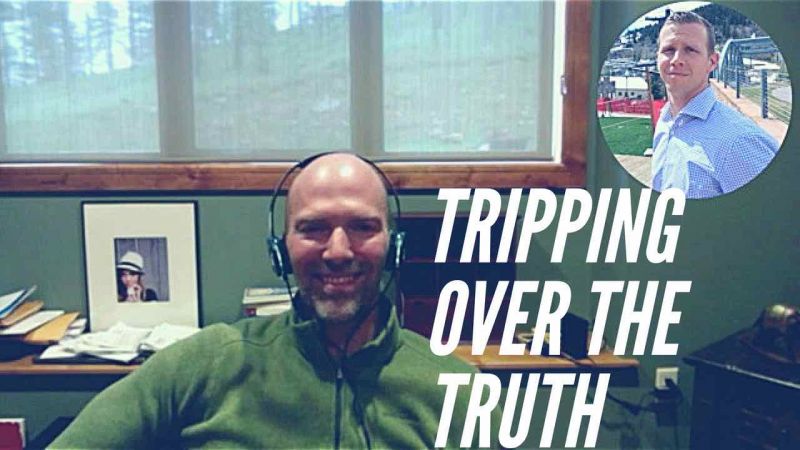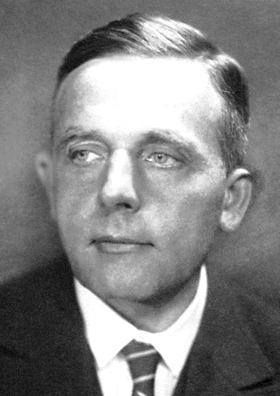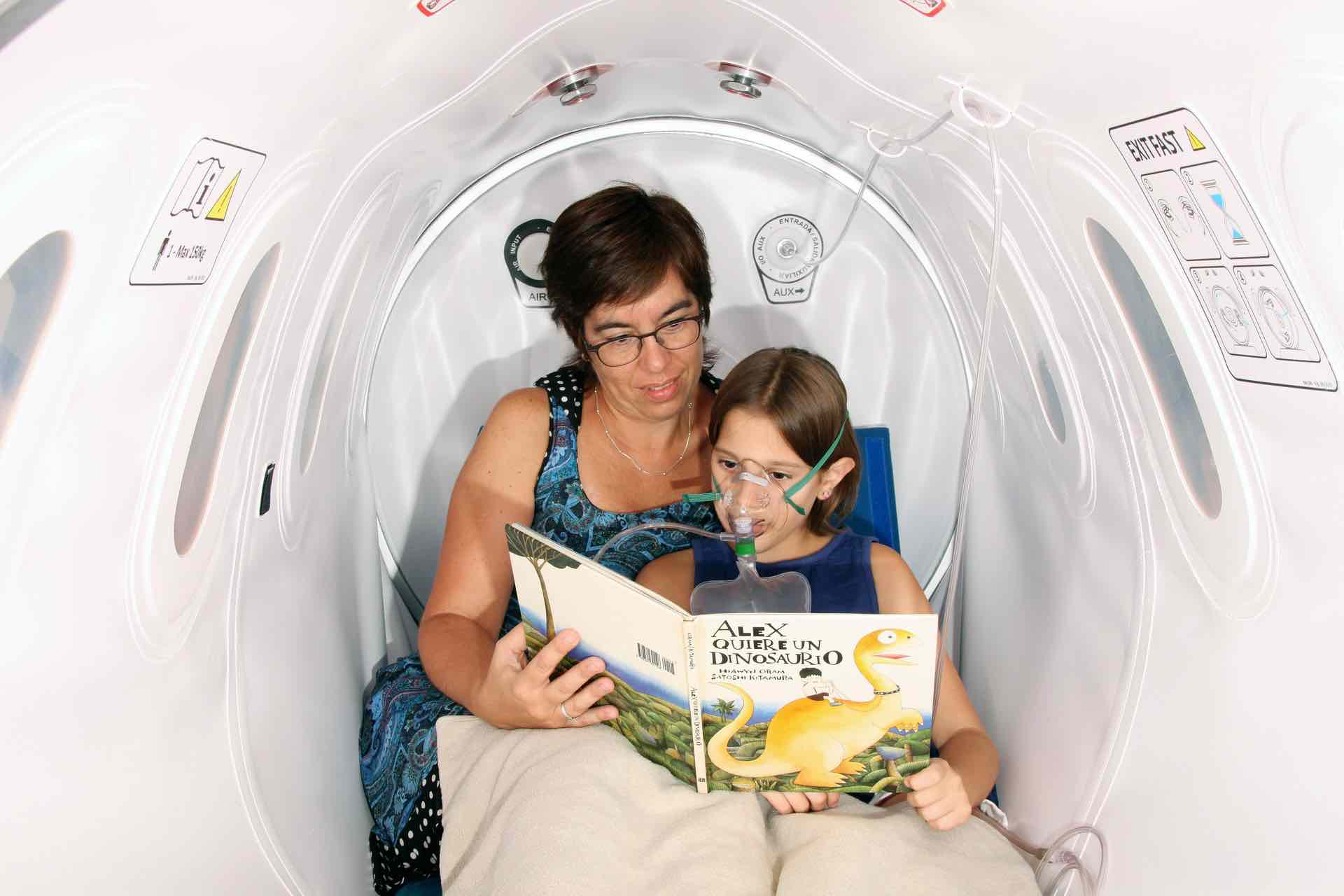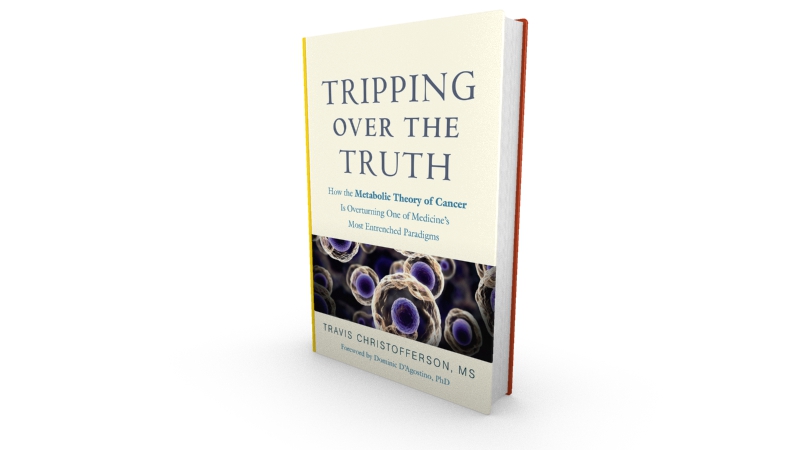
Layman’s Guide to the Metabolic Theory of Cancer: Travis Christofferson
Podcast: Play in new window | Download
The Stern Method Podcast Episode 8
Travis Chistofferson wants to make sure we understand exactly what the metabolic theory of cancer is and why it is so vitally important in preventing and reversing cancer.
Travis’ book Tripping over the Truth was basically written for the exact purpose of taking Professor Thomas Seyfreid’s (episode 006) book Cancer as a Metabolic Disease which is more of a textbook converting it into something easier for the public to digest and give more of the backstory which is why it’s the very first book I recommend to anyone that really wants to understand cancer and how we got to where we are today.
In This Episode:
- The metabolic theory of cancer itself and why it’s so important for anyone going through cancer to understand.
- How cancer cells can actually turn back into healthy cells if their metabolism is able to be corrected or if not how they can be weakened and killed off altogether with this approach.
- The best dietary strategies and best known therapeutic interventions such as the ketogenic diet and oxidative therapies.
- Travis’s thoughts on the success of approaches such as the Gerson Therapy which are high in sugars and antioxidants.
- The history of modern cancer treatment going back to Otto Warburg who first put this viewpoint out there back in the mid 1900’s and how it is that we’ve managed to get so wrapped up genes and really miss the forest for the trees.
- Epigenetics and how we should look at them in light of the metabolic theory of cancer.
Travis Chistofferson’s Thoughts on Childhood Cancer
As we noted in the article summing up Professor Thomas Seyfried’s interview on cancer as a metabolic disease, a defective or altered cellular metabolism (how cells produce energy) is the one trait that is consistent across all cancer types. Instead of burning oxygen combined with either glucose or ketones (from fat), cancer cells ferment glucose anaerobically (without oxygen), even when oxygen is available. This altered respiration includes childhood cancer, which is comforting because sometimes it can feel like EVERYTHING in childhood cancer is different from adult cancer.
I asked Travis Christofferson his thoughts on childhood cancer above and beyond this commonality and he did have a few.
He noted that most childhood cancers tend to have fewer genetic mutations than in adults. He said that although there is not a great answer for why, it could have something to do with epigenetic inheritance.
As you’ll see later in this article, epigenetics is your genes actually turning up, down, on, or off based on environmental factors such as diet and lifestyle. We can actually inherit these settings where they were left off in our parents more or less. So while it’s kind of like inheriting “bad genes” in the case of cancer or other disease, it’s also not as the settings are entirely able to be changed, it’s just a matter of figuring out how. See our upcoming interview with Dr. Paul Anderson for MUCH more on this topic.
On this note, Travis also pointed out that the BRCA gene tends to be turned off in childhood leukemia. BRCA is most commonly known for being mutated in some breast cancers, but in its intact, proper functioning form it is a tumor suppressor.
So again, if I were dealing with childhood leukemia, I would be looking into natural compounds that have been shown to promote BRCA expression.
Travis Christofferson’s Tripping over the Truth: The Metabolic Theory of Cancer
Travis Chistofferson’s book Tripping over the Truth: The Metabolic Theory of Cancer does a beautiful job of laying out the last 100 years of cancer, both in theory and in treatment, in a story format that is both entertaining and easy for just about anyone to understand.
If you want to really take your understanding of cancer and just how it is we’ve gotten to where we are today in terms of both how mainstream medicine views cancer and how to treat it along with explaining information yourself on alternative approaches that more accurately address primary upstream drivers of cancer, it’s my highest recommended book.
It should also be noted that a strong working knowledge of the metabolic theory of cancer (as opposed to the commonly accepted mainstream theory that cancer is a genetic disease of the DNA) and the history of cancer treatment itself is crucial for understanding exactly why mainstream medicine thinks the way it does about cancer, why success rates aren’t better than they are after all these years of research, and what you can do to increase your odds.
Professor Thomas Seyfried, who was interviewed in episode six of The Stern Method revived this theory with his book Cancer as a Metabolic Disease that was first proposed almost 100 years ago now by Nobel Prize winning scientist Otto Warburg all the way back in the 1920s. As I note in the introduction to Travis’ interview, Seyfried is a professor at one of the top colleges in the nation and as such his book is more of a textbook and the way he talks can sometimes go over peoples’ heads.
Travis does a great job of translating in this interview and his book that is easy to follow along with.
What Did Otto Warburg Discover?

In looking for a common bond between all cancers, or a hallmark, Warburg noticed a striking similarity in cancer cells that differentiate them from normal cells. What he saw in all of them was the fact that even in the presence of oxygen, cancer cells ferment glucose to produce energy, whereas normal cells use their mitochondria to burn oxygen and glucose together for this purpose.
Warburg also expanded on this and proved that you could turn a normal cell into a cancer cell within minutes.
He proposed that cancer was really a disease of the mitochondria, not the genes as was becoming the predominantly accepted even back then.
Warburg would be ridiculed for this “overly simplistic” view of cancer all the way throughout his life until his death in 1970. Scientists would generally praise his overall scientific accomplishments with this one exception.
When DNA was discovered in 1953 it was only natural to assume that cancer must be a problem with the genes and Warburg’s theory was unceremoniously pushed aside.
Now almost 100 years after it was first proposed, Warburg’s theory is being not only brought back to light but proven in spades by people Seyfried and Christofferson.
The Primary Driver of Cancer – How Could Science Get It Wrong?
The thing about the DNA in relation to cancer is, even though it’s the predominant theory, mainstream medicine has really yet to prove it. Even to themselves.
The Cancer Genome Atlas Project, where they mapped the genomes and mutations of all cancers, was supposed to lead to the breakthroughs they’d been waiting for and finally cure cancer. What they found was that the mutations were for the most part were completely random, they couldn’t do anything meaningful with the data at all, and the project resulted in virtually no accomplishments whatsoever.
Yet still the press on.
A Travis points out in the interview, the history of cancer research and theory can be described as groupthink on a mass scale. Once a text book is written, medical students take it for gospel and do not attempt to come to their own conclusions.
There are millions of studies at this point that have been carried out pertaining to cancer but very few people to actually step back and attempt to connect all the dots in a very meaningful way. On that note by the NIH’s own admission it is coming to light that up to 90% of studies published studies aren’t even reproducible (meaning they could be wrong anyway).
A group of studies that were able to be reproduced time and time again however were the nuclear transfer experiments. In these experiments researchers took a healthy nucleus (the part of the cell which holds the DNA) of a cell and put it inside the cytoplasm (the rest of the cell, that holds the mitochondria) of a cancer cell.
Just from being inside that cancer cell cytoplasm, the genes in the nucleus would start to mutate and the nucleus itself would soon turn cancerous. The same thing happened going the other way. Take the nucleus of a cancer cell and put it inside the cytoplasm of a healthy cell, the mutations go away and the nucleus becomes healthy.
To illustrate just how strong the groupthink is within the mainstream scientific community is, Travis talked about a discussion he’d had with a top scientist at MIT. Travis told the scientist about the nuclear transfer experiments, to which the scientist replied “it that were true, it would turn cancer research on its head.” When Travis offered to send him the studies, he said no, he didn’t want to see them. It must not be true because if it was, “someone would have noticed by now.”
Well… of course no one is going to notice if this is the way everyone thinks.
Do Genetics Play a Role in Cancer at All?
According to Travis (and the researchers and scientists he summarizes), pure, hard coded genetics that you are born with that will result in cancer no matter what most likely have little to no role in cancer.
What does have a role is the field of epigenetics. The study of how genes can actually turn be expressed more or less, or turned on and off entirely, based on environmental inputs (diet, lifestyle, etc.).
Travis points out that epigenetic changes are happening inside of us constantly throughout the day. Think of them as little volume control knobs on a big sound mixing board that an audio engineer is continuously tweaking.
Travis points out there is a huge interplay between the genes you might be born with and this understanding of epigenetics. If an identical twin has schizophrenia, the other only has a 50% chance of having it themselves. How can this be so if they are genetically identical?
The difference lies in the epigenetics. Even though they were both born with genes that predisposed them more to being schizophrenic, from an epigenetic perspectives one’s environment pushed them all the way into schizophrenia whereas they other’s went the opposite direction and turned those troublesome genes back down.
In cancer, epigenetics do play a role, they are just not the primary upstream driver. The metabolic theory says that cancer begins with damage to the mitochondria and cellular energy production, which then sends an epigenetic signal to upregulate genes involved with cell division and down regulate tumor suppressor genes to compensate. Mutations can occur from there as well and these factors combined can certainly influence the personality of the cancer (which do make them still valuable to look at), but are not the main driver.
So How Do We Restore Mitochondrial Function?
Travis Christofferson points out that in this light, researchers are beginning to discard the notion that “every last cancer cell must be killed,” and starting to talk in terms of “diplomacy” with the cancer cells and coercing them back into being healthy through restoring mitochondrial function and therefore epigenetic regulation.
Travis says researchers are finding that both fasting and the ketogenic diet (which it should be pointed out is designed to mimic fasting in the effect it has on the body) are both coming to light as excellent ways to restore mitochondrial function.
The ketogenic diet is named as such because in the absence of sugar (like when you’re fasting) the body will produce a compound called ketones from dietary or body fat the mitochondria can burn as an alternate fuel source to sugar. Travis points out that in addition to the fact that healthy cells are able to use ketones for energy whereas cancer cells are not, the presence of ketones themselves seem to have an anticancer effect all on their own.
If you put cancer cells in a petri dish with the an equal amount of sugar in each, but add ketones to one of the dishes, many cancer cells in the ketone dish will slow down in their replication dramatically or die altogether. Researchers are coming to find that ketones are HDAC inhibitors (something that influences epigenetic expression in a good way for simplicity’s sake).
As we’re starting to see, even though the metabolic theory states that mitochondrial function is the upstream driver in cancer, it’s still very much entwined with epigenetics.
On this note, one point Travis made that almost makes you want to go back to epigenetics being the upstream driver is that researchers are finding that when we age, genes that encode for mitochondrial function are downregulated. The mitochondria themselves are fine, and there is no mutation in the gene that tells the mitochondria to work itself, it’s just turned down so to speak.
Travis says that fasting and the ketogenic diet are being show to not only turn up mitochondrial function directly, but also to reset the gene that encodes for it. Interestingly, something else that has been found to have a very powerful effect in resetting this gene is GLYCINE, and amino acid found in very high levels in BONE BROTH… in case you needed one more reason why bone broth is good for you.
Oxygen Therapies Enhance the Anticancer Effect of Fasting and Ketosis

Oxygen therapies such as hyperbaric oxygen and the use of an oxygen concentrator with a mask serve two purposes according to Travis – both oxidizing them using the corrosive power that oxygen can have and also forcing them to breathe normally again.
Hyperbaric oxygen chambers force oxygen into the body’s tissues at a deeper level than what could be achieved otherwise. As we discussed, hard shell style chambers are much more effective at achieving this effect than soft shell, however gaining access to them can be tricky. In a hospital setting they are only allowed to be prescribed for “approved” uses, and anticancer treatment is not one of them (although radiation burns is, so if you are going through radiation you might want to try talking your way into one). Depending on where you live privately owned hard shell chambers may or may not be nearby, and if they are they are usually quite expensive to use on a regular basis.
Travis points out that simply using an oxygen concentrator (a machine that takes air in the room and concentrates the pure oxygen) and breathing this through a mask can also achieve very high levels of saturation at home at a fraction of the cost. I asked about ozone (for brevity’s sake, a different very powerful form of concentrated oxygen), and while Travis had not dug too deep into it himself he did agree that it sounds extremely promising in this regard and told the story of a naturopathic doctor named Robert Rowen who brought ozone therapy into the middle of Africa during the ebola epidemic and began seeing incredible remissions in victims until he was shut down for the usual reasons.
As we know (yet it’s still kind of hard to wrap your mind around if you think too hard about it) oxygen can be either extremely damaging (oxidizing) or life giving (oxygenating) depending on the context.
When we talk about oxidation, we’re talking about free radicals or reactive oxygen species that can be damaging to cells. Christofferson points out that cancer cells are able to use glucose to produce their own antioxidant system. When glucose is restricted through fasting and ketosis, they become much more vulnerable to oxidative stress produced by the body’s own immune system and outside help from oxygen based therapies.
In this sense of oxygenation, the life giving side to oxygen that our cells need to breathe, similar to the discussion earlier on restoring mitochondrial function through fasting and ketosis, when oxygen is forced inside of a cancer cell to the degree we’re talking about with these therapies, many of them will actually begin breathing normally again and be recruited back into the society of cells.
I asked Travis if he had any thoughts on cancer cells being able to take advantage of dietary antioxidants from vitamins and polyphenols. He said while he wasn’t sure one way or the other on that in particular, he did mention that ketosis was the only thing he knew of that has been proven to differentiate in this regard. It serves to pack healthy cells with antioxidant protection and deprive it from cancer cells simultaneously.
The Big Picture
I’ll keep it brief. The debate between the “eat as much fruit and drink as much carrot juice as you can” Gerson Therapy crowd and the “restrict any form of glucose at all costs” keto crowd rages on.
As convincing as the benefits of and research behind glucose restriction are and the amazing results people are seeing from it, I just interviewed Patrick Vickers of the Northern Baja Gerson Institute (we’ll be releasing the interview in a few weeks) and he made some very good points in support of taking in natural fruit sugars, and lots of them. Our first two interviews on this show were with Chris Wark and Ryan Luelf, both of whom used the high food sugar approach to completely heal themselves of very serious cancer diagnoses.
To me personally, both sides are right. Both approaches clearly have very substantial and demonstrable benefits and success stories (even though neither side wants to acknowledge anything good that’s come from the other), and both have their place in a more strategic rotation in the long term healing process or preventative strategy.
This all-inclusive philosophy is a big part of what we walk cancer parents and adult patients alike through in our coaching program.
https://youtu.be/3DsxfUlMI0w
Resources Mentioned:
- Oxygen concentrator
- Ozone Generator
- Bone Broth
- Ketogenic Diet Resources
- Dr. Slocum & Travis Christofferson Interview on Mercola
- Care Oncology Clinic

Thanks Ryan and Travis! Our dietary rituals have gone seriously wrong and the masses have NO idea. We are feeding cancer! I encourage everyone to make changes now! Don’t wait for the Lump or Bump!
I am not advocating either way but I do know personally people who have “terminal, metastatic cancer” in full remission from doing proper keto diet. Also, the research on Gerson therapy is truly dismal. What there is, mostly was done as anecdotes by Gerson himself. A few years ago Dr Greger/Nutritionfacts.org did a video on research comparing Gerson vs chemo for pancreatic cancer. The chemo group lived 3 times longer and had significantly better quality of life!
https://nutritionfacts.org/video/gerson-therapy-vs-chemotherapy/
Chabot JA, Tsai WY, Fine RL, Chen C, Kumah CK, Antman KA, Grann VR. Pancreatic proteolytic enzyme therapy compared with gemcitabine-based chemotherapy for the treatment of pancreatic cancer. J Clin Oncol. 2010 Apr 20;28(12):2058-63.
Cassileth B. Gerson regimen. Oncology (Williston Park). 2010 Feb;24(2):201.
Also, so far as I can tell, Chris Wark did not and does not now eat a “high sugar” diet. For 1st few months he ate a fairly low glycemic raw vegan diet. Since his recovery he has been eating small amounts of animal products in addition to his high complex carb diet.
Also, so far as I can tell, Chris Wark did not and does not now eat a “high sugar” diet. For 1st few months he ate a fairly low glycemic raw vegan diet. Since his recovery he has been eating small amounts of animal products in addition to his high complex carb diet. Not ketogenic for sure but nowhere near “high sugar”
I don’t understand why there isn’t more discussion about IPT for cancer treatment.
I had an extremely aggressive NHL and after much research into the harmful affects chemo & radiation I decided not to go for the ‘POISON.’ No hair loss, no vomiting, no diahreah, no radiation, no Prednisone. I would drive an hour & 20 minutes for a treatment then get back in the car and drive home. It’s the most sensible approach to cancer and should be routine but there’s no $ in it for Big Pharma.